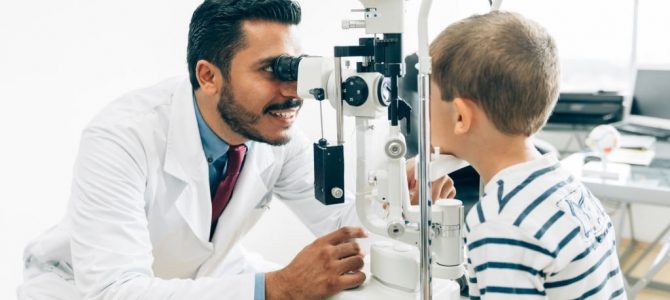Leading Cardiologist in Andalusia: Expert Heart Treatment at Your Local Clinic
Leading Cardiologist in Andalusia: Expert Heart Treatment at Your Local Clinic
Blog Article
Is Refractive Surgical Procedure Right for You? Variables to Take Into Consideration for Better Eyecare
In the world of eye care, the decision to go through refractive surgery is a significant one that demands thoughtful factor to consider. As people seek clarity and freedom from the restrictions of restorative lenses, countless variables enter into play when identifying the suitability of such a procedure. From the complexities of one's ocular wellness to the complexities of everyday habits and individual expectations, each aspect holds relevance in the more comprehensive landscape of refractive surgical procedure candidateship. By evaluating these key elements with care and precision, a more clear path in the direction of notified decision-making arises.
Eye Health Examination
When thinking about refractive surgical procedure, a thorough eye health analysis is crucial to analyze the suitability of the procedure for every individual. eye center andalusia. This analysis involves a series of examinations and tests performed by an eye treatment expert to identify the overall health of the eyes, the presence of any kind of underlying problems, and the stability of the refractive mistake
During the assessment, various elements are considered, such as the individual's case history, present eye prescription, corneal thickness, pupil size, and tear film top quality. These analyses assist to identify any type of contraindications to refractive surgery, such as corneal irregularities, cataracts, or unattended eye infections. Furthermore, the examination helps to manage client assumptions relating to the possible outcomes of the surgical procedure based upon their distinct eye qualities.
Eventually, the eye health and wellness analysis is necessary in making certain the security and efficiency of refractive surgery, as it offers important understandings into the individual's eye health status and aids figure out one of the most suitable treatment options for attaining ideal visual results. (neurologist andalusia)
Way Of Life Evaluation
A thorough way of living assessment is essential in determining the suitability of refractive surgical procedure for an individual's visual modification demands. Lifestyle aspects such as line of work, pastimes, and day-to-day tasks play a vital duty in the decision-making process relating to refractive surgical procedure. Individuals with careers that include a high level of physical activity or exposure to environmental elements may have different visual needs compared to those with less active workdesk jobs. Comprehending just how an individual's way of living might impact their vision post-surgery is essential for handling assumptions and ensuring optimal end results.
Additionally, lifestyle practices such as sports participation, outdoor tasks, and even skincare routines can affect the healing procedure and total success of refractive surgical treatment. As an example, people that participate in call sports might require to take additional precautions to shield their eyes during the recuperation duration. Furthermore, people with considerable sun direct exposure might call for additional post-operative like avoid problems. By conducting a thorough way of living analysis, eye treatment specialists can tailor their recommendations and treatment strategies to fulfill the distinct demands of each person, inevitably resulting in improved visual end results and complete satisfaction.
Expectation Positioning

Establishing reasonable expectations involves thorough pre-operative conversations in between the eye doctor and the person. The cosmetic surgeon ought to transparently communicate the potential threats, benefits, and constraints of the procedure (cardiologist andalusia). People require to comprehend that while lots of individuals accomplish 20/20 vision or better following refractive surgical procedure, some may still need glasses for sure activities like analysis or driving at night. Managing these assumptions assists stop frustration and discontentment post-surgery, causing a much more positive general experience for the person.
Danger Evaluation

Variables that might eye center andalusia enhance the threat of issues consist of age, particular medical conditions like autoimmune conditions, unstable vision prescription, thin corneas, and unrealistic individual assumptions. In addition, choosing a knowledgeable and skilled specialist, adhering to pre and post-operative treatment instructions carefully, and disclosing any kind of pertinent medical background can aid mitigate dangers.
To reduce the chance of problems, ophthalmologists conduct thorough pre-operative analyses to identify any type of contraindications to surgery. They also review the potential threats and benefits with individuals throughout the assessment process. By engaging in open interaction and shared decision-making, both the ophthalmologist and the client can function with each other to figure out if refractive surgical treatment is the best choice based upon specific risk profiles and preferred outcomes.
Consultation Value
Considering the vital function of notified decision-making in assessing threats and possible problems in refractive surgery, the appointment process holds substantial importance in assisting individuals in the direction of optimum outcomes. Throughout the appointment, the eye doctor evaluates the person's eye health and wellness, refractive errors, and overall suitability for surgery. This initial evaluation is critical in identifying one of the most ideal treatment for every person, considering factors such as corneal density, pupil size, and existing eye problems.
In addition, the examination acts as an opportunity for patients to discuss their expectations, concerns, and any inquiries they might have regarding the surgical treatment. Clear communication between the surgeon and the individual is necessary to ensure sensible expectations and an extensive understanding of the potential threats and advantages entailed.
Furthermore, the consultation permits the surgeon to explain the various medical choices offered, their respective end results, and the post-operative care called for. This thorough discussion equips people to make knowledgeable choices about their eye treatment, causing far better complete satisfaction and results post-surgery.
Verdict
Finally, people taking into consideration refractive surgery should undertake a thorough eye wellness evaluation, assess their way of life practices, align their assumptions with prospective outcomes, assess the connected threats, and focus on assessments with eye treatment professionals. These elements play an important function in establishing the suitability of refractive surgical treatment for every person, making sure optimum end results and contentment with the treatment.
People taking into consideration refractive surgical treatment commonly have high assumptions relating to the results, expecting perfect vision without the demand for glasses or call lenses. While refractive surgical procedure can considerably enhance vision and lower dependence on aesthetic aids, it is essential for patients to recognize that outcomes may vary based on specific aspects such as the degree of refractive mistake, corneal thickness, and total eye wellness.
By engaging in open communication and shared decision-making, both the ophthalmologist and the patient can function together to determine if refractive surgical procedure is the best choice based on individual threat accounts and wanted results.
Thinking about the critical role of informed decision-making in assessing threats and possible difficulties in refractive surgery, the examination procedure holds substantial value in assisting clients in the direction of optimal end results. During the appointment, the ophthalmologist reviews the client's eye wellness, refractive errors, and total viability for surgical treatment.
Report this page